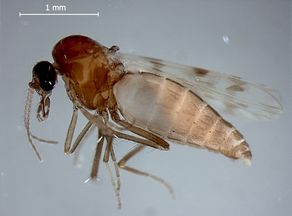Contact
Address
Office
VICE
Vector borne infections: risk based and cost efficient surveillance systems (VICE)
April 2012 - December 2015
Financed by the Bundesanstalt für Landwirtschaft und Ernährung

Culicoides (female) (C. Pulicaris-komplex).
(photo: Sonja Steinke)
English:
In consequence of globalisation and climate change, vector-born diseases constantly gain importance in Europe. Examples are the Bluetongue virus, transmitted by biting midges (Ceratopogonidae) or the West Nile virus with several mosquito species (Culicidae) as potential vectors.
The aim of the EU-research project VICE is the development of a computer-based surveillance system that allows a continuous estimation of the outbreak risk of such diseases. Thus, in times of high outbreak risk fast and specific preventive actions are possible.
The system relies on knowledge about vector ecology and the progression of vector born diseases. Within this project, the research group Aquatic Ecology and Nature Conservation performs research on the ecology of mosquitos and biting midges and their distribution in Germany.
Project partners:
DTU (Technical University of Denmark) - project coordination
WUR - Wageningen University & Research centre (Netherlands)
NVI - Norwegian Veterinary Institute
FLI - Friedrich-Löffler-Institut (Germany)
VPHI - Veterinary Public Health Institute, Universität Bern (Switzerland)
SVA - National Veterinary Institute (Sweden)
INRA EpiA - Animal Epidemiology Unit (France)
CODA-CERVA - Veterinary and Agrochemical Research Centre (Belgium)

